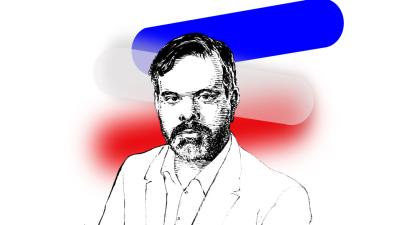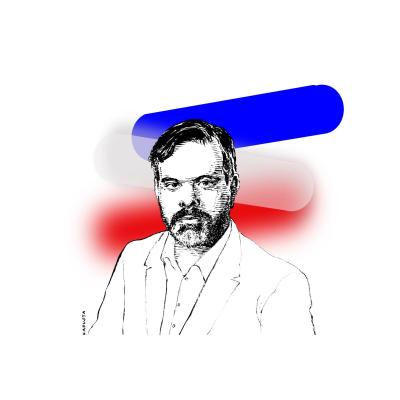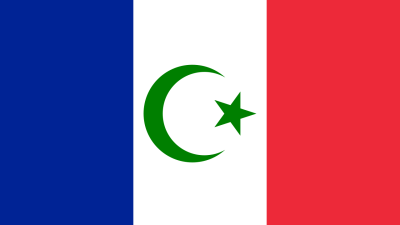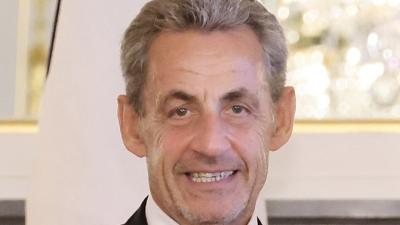The month of September may have seemed strangely quiet in France, but it was nonetheless a time of major upheavals. There was Africa, of course, with France's withdrawal from Niger and Lampedusa, and Germany, whose increasingly murky actions are raising questions. But there was also a certain convergence in the way the mainstream media and pro-Russian social networks (SN) handled the news. Beyond the facts, what is the hidden message of a new narrative that is taking hold?
Let's start with a piece of news that should have caused a political upheaval but that hardly anyone has mentioned. According to Intelligence Online (a French media outlet devoted to the intelligence services that has revealed several suspect affairs), the FBI has in its possession several contracts "operated for Russian interests" by the former head of French domestic intelligence (under Nicolas Sarkozy), Bernard Squarcini. Yet another former high-level French intelligence official caught with his hand in the Russian pot. Rather than question the infiltration of the French state in general and its intelligence services in particular by foreign agents, the media have preferred to keep quiet about this affair. The 'experts' will tell you that the ABCs of intelligence work are to let the agents you have spotted do their job in order to manipulate them, withdraw information from them or feed them with false data. Why not - but then you need results. From the outset, we've been taken for a ride by the Russians. Our services saw nothing coming, still haven't understood what happened and have no insight in the matter. On the other hand, a whole nest of Russian agents made up of former diplomats, think tank directors, generals, senior civil servants, ministers and former presidents are helping to spread the narrative of a state that is hostile to us and is poisoning the minds of our political decision-makers, senior civil servants, media and fellow citizens with complete impunity (see my analysis: delibeRatio - Nicolas Sarkozy and the Russian Party of France).
Former President Sarkozy's suggestion that we put pressure on the victim, Ukraine, to give in to the demands of its executioner, Russia, not only created controversy, but also legitimised the Russian narrative. Indeed, very few media outlets took the time to explain how Mr Sarkozy's argument was a complete rehash of the main language used by the most downmarket pro-Russian influencers on social networks. How this narrative was false, aberrant and served only Putin's interests. Secondly, without hiding it, the media were rather reluctant to point out that Mr Sarkozy had signed several contracts with Russian funds worth more than €3,000,000. Worse still, some claimed, without proving anything, that we had no right to suspect the former President of the French Republic. In addition to this form of compromise by the vast majority of the media, a whole deception machinery was put in motion. Former ambassadors, ministers, influential figures and think tank directors all came out of the woodwork to tell us that, given his experience, Nicolas Sarkozy should be listened to, that he was taking part in the debate, that he was saying out loud what was being said in hushed tones at headquarters or among Western political leaders. Then Lampedusa came along. At first, we had the usual ping-pong between the right and the progressives. But when it became fairly likely that this was a trial run for the Russians to use migrants to destabilise us (see my analysis: delibeRatio - Le Flanc sud de l’Europe sous attaque russe), everyone fell silent. The Right, for fear of being criticised for its pro-Russianism, and the progressive parties for ideological reasons, did not want immigration to be equated with any kind of danger. Since that time, the pro-Russian right and the progressive parties have seemed to be in a state of flux. Then came the domestic row between Poland and Ukraine. Initial comments analysed the situation fairly well. Mr Zelensky, by implying at the UN that Poland was working for the Russians, had committed an incredible faux-pas in view of the more than 3 million Ukrainians welcomed by the Poles and all the military aid received from Warsaw. The Polish-Ukrainian dispute over wheat alone could not explain it. The Polish President's response, using the metaphor of drowning: "when someone is drowning and you want to try saving them, you have to watch out that they don't take you with them in their desperate fight for survival", was certainly blunt. Yet in the middle of an election campaign when a rival right-wing party was criticising the current government for giving too much aid to the Ukrainians, he had little choice but to respond strongly.
Then, a few hours later, the Polish Prime Minister gave an interview in which he declared, among other things, that his country would "definitely maintain the transit of Ukrainian goods" and would "certainly not jeopardise Ukraine's security - which is why the Rzeszów platform, in consultation with the Americans and NATO, continues to play the same role it has had up to now. And it will continue to do so. To questions about the dispute between Kiev and Warsaw, he replied, "If I had to look for something to justify it (Ukraine), it would only be what we all know perfectly well: that Ukraine is defending itself against Russia's brutal attack, and we understand that this attack is creating a completely unprecedented situation, which we have not faced since the Second World War. Asked whether Poland would continue to support Ukraine militarily, Morawiecki replied that at present "Poland does not supply Ukraine with any weapons, because from now on we are going to arm ourselves with the most modern weapons (...) If you want to defend yourself, you must have something to defend yourself with." It's important to understand that while all the Western countries have drawn on their stocks to arm Ukraine, Poland has donated its stocks and the weapons used by its soldiers, almost 50% of all its heavy military equipment. It has nothing left to give and now, as the country on the front line against Russia, it has to rearm itself quickly with modern equipment.
The next day, and I still don't know how it happened, all that the press picked up on was "Poland no longer wants to arm Ukraine", and many commentators also invented the idea of Poland stopping all aid to Ukraine and imposing a virtual embargo on Ukrainian goods. The new narrative is that nationalist Poland no longer wants to arm Ukraine. This helps change the attitude of Western populations who are fed up with the war (which they are not waging, unlike the Ukrainians). Some mainstream commentators have even gone so far as to repeat the pro-Russian influencers' narrative of Poland having inordinate imperialist ambitions that were quickly quashed by the Americans and Ukraine being an ungrateful beggar that even the Americans can no longer stand. Barely 6 months ago, the mainstream media would have drawn the conclusion that Poland had run out of weapons and that the West urgently needed to rearm. Today, no, they are taking up the Russian narrative, about insolent Poland wanting to take advantage of the war to enslave Ukraine, which, having failed, should think about negotiating with Moscow (and therefore submitting to it). Since the start of the war, there has been a clear dividing line between the mainstream media's treatment of the news and the pro-Russian RS. This difference is now becoming blurred.
"Strangely enough, during all this time, no media outlet has taken note of Germany's murky game. At the UN, Mr Zelensky, who was in urgent need of German weapons, at the same time as suggesting that Poland was working for the Russians, demanded that Germany should become a permanent member of the Security Council. This is Berlin's main demand at international level. How can the most knowledgeable French experts fail to see that for Berlin since the Russian invasion Poland is beginning to take up too much space in Central Europe with its alliance with Ukraine? Germany, which is not only losing influence after breaking its alliance with Russia, but is also faced with the bankruptcy of its energy and mercantilist policies, is sinking into an economic slump. Berlin needs the war to end, and quickly, because its manufacturers are being squeezed by energy costs and the flagging Chinese economy. Yet in the current state of affairs deciding on its own to break the European consensus on Ukraine would be a huge loss of prestige for Germany. The country would also risk jeopardising its place within NATO, which is considered by all the German government parties to be the only conceivable and viable solution for their defence for at least the next ten years. On the other hand, it is certain that if the PiS party currently in power in Warsaw were to lose the Polish elections in October, it would be a major step towards appeasement with Moscow, since the PiS is now the driving force within the EU behind support for the Ukrainians.
It is also astonishing that none of the media highlighted Chancellor Scholz's populist remarks against Poland. He interfered in the Polish parliamentary elections by repeating an unproven accusation by the Polish opposition against the PiS party in power in Warsaw for allegedly allowing a network of corruption in its embassies selling Schengen visas. [According to the Polish government, fewer than 400 visas were sold illegally, while the progressive opposition (which is in favour of renewing a strong partnership with Germany) claims that 400,000 were sold for an average of €5,000 each (equivalent to €2 billion in revenue, which would be colossal and easy for the European financial institutions to trace). The Chancellor is alarmed, but according to the German Federal Office for Refugees, between January 2021 and May 2023, just 1,230 people who had applied for asylum in Germany had obtained a visa issued by the Polish authorities, which is very few]. If the interference of a German chancellor in the Polish election campaign, in Russia's obvious interest, were not so serious, it would almost be funny to see Berlin accuse Warsaw of letting migrants through, when until recently the latter was indignant about the opposite. Germany's interference in this controversy in the middle of the Polish election does nothing to help the main opposition party, the PO, led by Donald Tusk, who is also pro-Ukraine. Its supporters don't need this to be convinced to vote against the PiS. There is virtually no transfer of voters between these two parties, which together account for almost 2/3 of the electorate. Some will say that this helps the PiS to mobilise the most nationalistic part of the Polish electorate, which cannot stand this kind of German interference. But in fact the divide across the Polish society is now increasingly turning towards another party even further to the right than the PiS: Konfederacja. According to the polls, Konfederacja is not in the position to win the elections, but it could force the PiS into a coalition government with it. However, Konfederacja is much less pro-Ukraine than PiS and is reluctant to accept the more than 3 million Ukrainians living in Poland. Many commentators believe that the PiS is taking advantage of the latest events at the UN with regard to Ukraine and Germany's interference to regain ground with its right-wing voters. In fact, it this is benefiting Konfederacja. In September, PiS lost 2 points and Konfederacja gained 3 points in the opinion polls.
This analysis could be seen as too critical of Berlin. But wasn't it Germany that, following the massive influx of migrants on the small Italian island of Lampedusa, temporarily stopped accepting migrants from Italy, yet at the same time decided to finance, via its Ministry of Foreign Affairs, boats to pick them up off the Libyan coast and bring them to Italy? The same Germany that is blocking the delivery of long-range cruise missiles to Ukraine, that is always slow to deliver the promised weapons, then delivers equipment in poor condition to Kiev and keeps the spare parts at home. Germany, which has built the Nord Stream I and II gas pipelines with Russia in breach of European legislation, against Europe's energy security and against the advice of the EU's Scandinavian and eastern countries. Germany, which wanted to impose its energy model based on a mix of renewables and Russian gas on the whole of the EU, which would have made the EU totally dependent on Russia, and forced Europeans to accept the Russian invasion of Ukraine. Germany, which, as mentioned above, is not only losing influence after breaking its alliance with Russia, but is also faced with the bankruptcy of its energy and mercantilist policies, is sinking into an economic slump. Germany, which needs the war to end quickly because its manufacturers are being squeezed by energy costs and the flagging Chinese economy, would like to return to the good old days of collaboration with Russia. What Frenchman can still believe in the fable of Germany being a "kind and benevolent power" when it has now been shown that Berlin has done everything in its power to sabotage, notably through European regulations and their foundations, French nuclear electricity, which used to be our industry's main competitive advantage and which enabled us not to be dependent on Russian gas?
What this war against French nuclear power has shown is that Berlin has a multitude of Parisian powerbrokers at its disposal, particularly in the political parties, the mainstream media and NGOs. When we compare this information with Françoise Thorn's analysis in Desk Russie (https://desk-russie.eu/2023/09/16/le-deuxieme-front.html), according to which Moscow is turning the decision-making circles in Washington upside down, we can wonder about the concomitance, in the same month of September, of the bad news coming from the United States for Ukraine, the operation to legitimise the Russian narrative in France launched by Nicolas Sarkozy and Germany's hostile actions against Poland. Nor can we rule out, for the moment, a coincidence of timetables and incompetence that will have been particularly advantageous to Russia.
On the other hand, it is undeniable that since September many of our elites have been slowly but surely falling into line with the Russian narrative. Not out of conviction, but most likely out of inaction. Nothing has been done to really rearm us in the year and a half that the Ukrainians have given us. The Russians, on the other hand, have done just the opposite. We no longer have any stocks to give to the Ukrainians. Only the Germans still have some. A major European emergency plan should be decreed, but the Germans don't want it - for it would run too counter to their own military investment plan. This involves doing with their army exactly what they have done with their industry: establish a high added value platform for European integration. They are investing in heavy resources for the chain of command and logistics that the other European armies will be able to interconnect with. Of course, as usual, Berlin is trying to convince European leaders that its policy is in their interest by selling this as a kind of German donation to European defence. In reality, it will surely be, to put it mildly: leadership for the Germans, slush for the others. But the worst thing is that it will be a good 10 years before this new organisation is effective. Russia will have plenty of time to get its act together and rebuild its army - which will also have had the experience of war, unlike us.
So, if we really want to find a subtext for the Polish leaders' comments on arming Ukraine, it is that after having "disarmed" itself for the benefit of Ukraine, in view of the unfathomable insouciance of their European partners and Germany's troubled game, Poland now has no choice but to rearm itself as a matter of priority, as soon as possible, in the face of the Russian ogre, which has only just sat down to eat.
Read also
Is France Islamophobic?
This may seem a surprising question, given that France welcomes tens of thousands of Muslims from Africa and the Middle East every year, despite the considerable costs involved.
Patrick Edery
Nicolas Sarkozy and the Russian Party of France
Let's look at the "Sarkozy case" for a moment, as it is so edifying.










Comments (0)